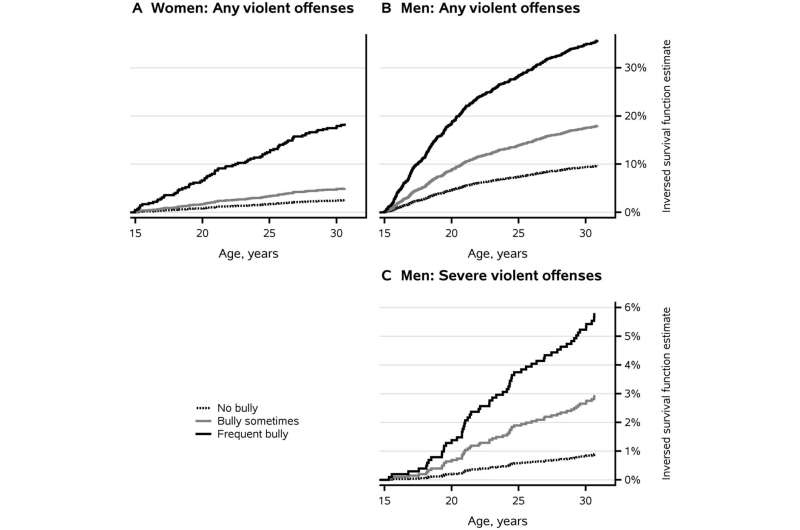Bullies have increased risk for violent offenses, shows comprehensive study

Children who bullied others at the age of 8–9 have higher hazard for committing violent offenses by the age of 31. This was shown in a Finnish Nationwide Birth Cohort Study conducted at the Research Center for Child Psychiatry at the University of Turku, Finland.
Boys and girls who were frequent bullies had an increased hazard for violent offenses as opposed to children who never bullied others. Boys who bullied frequently also had higher odds for violent offenses compared to those who bullied sometimes. The relative hazard for boys who were frequent bullies to commit a severe violent offense such as homicide or aggravated assault during the follow-up period was almost three times as large as for the boys who never bullied.
Being a victim of bullying was not associated with an increased risk of committing violent offenses.
The study considered the background factors of socioeconomic status and possible childhood psychopathology. The association between bullying and violent offenses remained even when the data were controlled for parental education level, family structure and possible child psychopathology. The results were also not impacted by the bully's possible other bullying experiences, such as being a victim of bullying.
"Our study showed an association between bullying and violent offenses both in men and women. These findings further confirm the previous notions that preventing bullying could possibly decrease violent offenses," says researcher Elina Tiiri from the Research Center for Child Psychiatry of the University of Turku.
Research-based knowledge helps prevent issues
The study is part of a larger research project that aims to discover the connections between childhood psychosocial problems and mental health disorders, substance abuse issues, mortality, self-harming, criminality, life management, and marginalization in adulthood.
"The research project produces knowledge that helps us develop services, early interventions, and prevention," says Professor of Child Psychiatry Andre Sourander from the University of Turku.
The research was based on extensive, nationwide epidemiological data collected in 1989 in Finland. At the time of the data collection, the participants were 8–9 years old. When the participants were 30–31 years old, the researchers extracted information about their violent offense suspicions from the Finnish National Police Register. The study, published in European Child & Adolescent Psychiatry, included 5,400 subjects.
More information: Elina Tiiri et al, Bullying at 8 years and violent offenses by 31 years: the Finnish nationwide 1981 birth cohort study, European Child & Adolescent Psychiatry (2022). DOI: 10.1007/s00787-022-01964-1




















